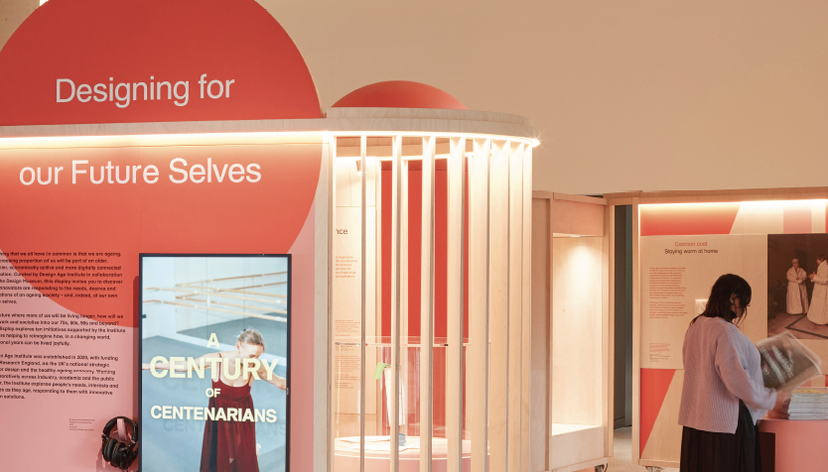Resources
Jump to
Discover and explore the most recent outputs from The Helen Hamlyn Centre for Design.
The Centre is actively engaged in Inclusive Design process and projects, and we are passionate about promoting and communicating our work as far as possible to a variety of audiences.
At its heart, Inclusive Design is about empathic involvement of people in the creative process. In our work, we have looked to enhance co-creation and facilitate respectful, creative interaction, thereby ensuring that our project outputs and processes are people-centred and that our ideas benefit all the recipients of a product, service, or system.
Design is most powerful and effective when it is inclusive, when it meets human needs and addresses social concerns. We have constantly considered this philosophy, and the work you see hopefully reflects it.
Watch
Design.Different series
The Design.Different series is a programme of events that highlight the work of the researchers within the Helen Hamlyn Centre for Design. Each month, one member of Centre staff is given free rein to host an event of their choosing, drawing on an international network of expert guests from across academia and industry. The events allow the researchers to share their work in progress and pick each others' brains to take their research forward.
Design.Healthcare: Honouring personhood in a healthcare setting
Tom Stables, Industry Project Designer, hosted this event, a conversation about representing and maintaining the personhood of someone receiving care in a healthcare setting.
Design.Value: The missing connection between design and politics
Innovation Fellow Ve Dewey hosted this event, which explored the dynamic between design and politics, how it currently stands, how it could be changed and evolved, and what is needed for this evolution.
Design.Convenience
Hosted by Professor Jo-Anne Bichard, Professor of Accessible Design, this event drew on the premise that there is an inherit convenience necessary in cities and urban spaces, in order for people to move around safely and effectively. However, what may be convenient for one person may be inconveniencing another. The question, then, is how to design cities that are inclusive of all.
Design.Resilience
HHCD Design Reseacher Madelaine Dowd hosted this event, which examined how, in a world where technologies are constantly advancing and providing dynamic new capabilities, humanity can look to thrive alongside technology. It asked the question 'with tensions around artificial intelligence's rapid rate of development, is humanity keeping up to ensure it still serves people needs?
Design.Wisdom
What is wisdom? How does it impact us as a society and as individuals? Should we design with wisdom in mind?
This conversation will investigate the intersection of wisdom, age, and design. Join Dr Dilip Jeste, a world leading expert on wisdom and author of the book Wiser: The Scientific Roots of Wisdom, Compassion, and What Makes Us Good, and Design Age Institute Director Colum Lowe for a conversation facilitated by DAI Knowledge Exchange Fellow Carly Dickson.
“Wisdom not shared is wisdom not gained but lost”
— Dilip Jeste
The panel will explore if and how sharing people's unique and diverse experiences of getting older can help us design a world that works better for everyone. Jeste’s research identified that there is an inverse relationship between wisdom and loneliness - the wiser we are, the less lonely we are. Using this as the starting point, the panel will consider what role design can play in supporting the exchange of wisdom between people of different ages and whether this could simultaneously contribute to combating loneliness, ageism, and generational divides.
Listen
At the Helen Hamlyn Centre, we believe in the power of conversation to inform, educate and change opinions. For the past 30 years, we have been having conversations with experts from across inclusive design, and we are excited to share some of those with you here.
Disguise Unveiled: Dr Patricia Moore in conversation with Dr Melanie Flory
In this conversation, Associate Director of Research, Dr Melanie Flory, speaks to globally renowned designer Dr Patricia Moore, who has been at the forefront of inclusive design for over five decades.
From 1979 to 1982, when she was in her 20s, Moore travelled throughout the United States and Canada disguised as women of more than 80 years of age. She aimed to fully understand both the physical challenges and the discrimination faced by this age group. Her experience of responding to people, products, and environments as an elder enabled an empathetic approach to design that informed much of her future work. In this talk, Dr Flory digs down into that experience, to understand what it was like to leap ahead 60 years, and how it has shaped her life, both professionally and personally, in the years since.
Streets for Diversity webinar
During Neurodiversity Celebration Week, Dr Katie Gaudion and Dan Phillips from the Intelligent Mobility Design Centre, hosted a webinar to share insights from their recent project, Streets for Diversity. They were joined in conversation by Dr Suzy Charman of the Road Safety Foundation and Dr Emily Öhlund, a participant in the project, whose PhD explored neurodiversity and higher education environments.
Funded by the Rees Jeffreys Road Fund, Streets for Diversity is a research project that aimed to bridge a gap in research about how neurodivergent people experience streets and hypothesised that our current streets and public realm may, by design, exclude those of us that are neurodivergent.
The project invited neurodivergent citizens, researchers, champions and transport experts to participate in a range of co-design activities. These included ‘walk and talks,’ which allowed participants to travel around in urban areas and share their reflections on their experiences in real time. The ‘walk and talks’ were supplemented by online surveys, interviews, and a co-creation workshop, which together explored the challenges and opportunities found in our urban streets.
In this webinar, the speakers shared their insights about how to make our public spaces more inclusive for everyone.
Read
Read the latest issue of our annual Design.Different magazine here.
Get in touch
Find out more about our research projects. Email us at hhcd@rca.ac.uk
hhcd@rca.ac.uk

